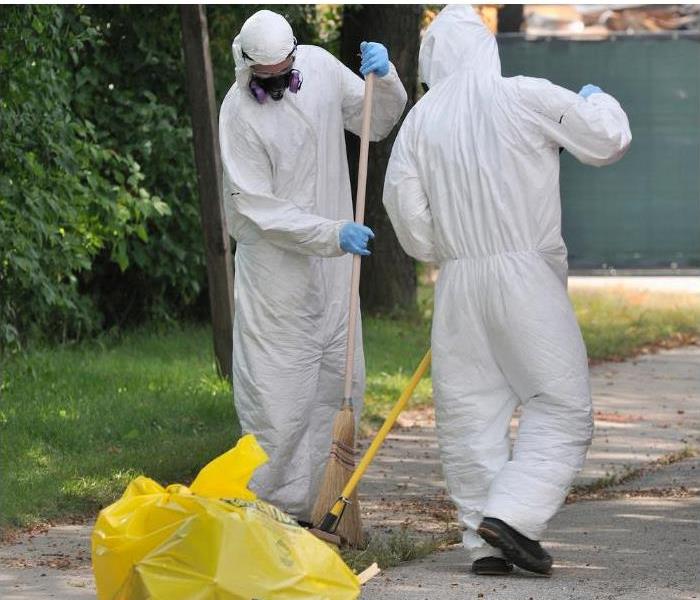Cleaning the Unthinkable: Services for Biohazard, Trauma, and Crime Scene Events
5/2/2023 (Permalink)
Cleaning the Unthinkable: Services for Biohazard, Trauma, and Crime Scene Events
Unfortunately, violent crimes, fatal accidents, and deaths are unavoidable facts of life. Because most of these occurrences can materialize quickly, the traumatic event will leave behind numerous traces of hazardous contaminants that call for specialty cleaning services that know how to handle trauma and crime scene clean-up. Accidents that include injuries and death, whether at home or in a commercial building, require extensive cleaning and specialized expertise. If an illness stemming from a dangerous pathogen is involved, enlisting a company that specializes in biohazard clean-up is necessary. SERVPRO of Wilson County is here to help with just that.
More Information about Trauma and Crime Scene Clean-up
Depending on the nature of the event, technicians may have to clean up bodily fluids, dried blood, or tissue fragments. These scenarios may be unpleasant, but rapid cleaning is critical. Below are a few steps in the clean-up process if a violent crime or another event created biohazard materials.
- The police will investigate and collect evidence if a crime is suspected.
- The biohazard cleaning company will assess the situation to determine what type of cleaning the site needs and how extensive the job will be.
- The cleaning company will clean and sanitize. They also remove some building materials or floor coverings, depending on the availability and accessibility of the crime scene.
Professional clean-up services are valuable in the aftermath of a violent crime as they are places people associated with the event do not want to be. The unpleasantness of traumatic situations is compounded by the health risk many of these scenes pose. Those risks to the public also pose a more immediate danger to anyone who tries to clean up the area without proper equipment and training. The same rule holds for crime scenes that do not involve human evidence such as drug labs.
Cleaning up in the aftermath of other traumatic events has similar risks. After any catastrophic or fatal situation, cleaning up can be similarly unsettling. When someone dies at home of an infectious disease, whether COVID-19, HIV, hepatitis, or MRSA bacteria, clean-up poses a biohazard to both clean-up workers and anyone in the house. Bodily fluids and blood left behind after a pathogen-associated death may expose residents, workers, and clean-up technicians; therefore, specialty services are crucial to safety.
To be safe and avoid exposure, as well as address any psychological fallout of the traumatic event in question, hiring a biohazard cleaning company can alleviate many burdens. A cleaning company that specializes in cleaning up after violent crimes and disease-related events will have to be able to comply with relevant EPA (Environmental Protection Agency) and OHSA (Occupational Health and Safety Administration) regulations.
About these Specialty Services
The common thread in all trauma and crime scene clean-ups is an effort to protect people in the home or business from exposure to hazardous chemicals or pathogens. Both tasks call for specialized equipment and training. The details of trauma and crime scene clean-up will naturally depend on the nature of the incident and the setting where it happened. But here are some general notes on how specialty cleaning services handle several types of events.
Fatal Fires and Accidents
If there was a fire, you will need smoke damage repair. The area will need deodorizing. Firefighting chemicals may need to be cleaned up as well. Of course, if the accident resulted in serious or fatal injuries, someone with the proper training and equipment might need to clean up blood and other fluids. Crimes that result in death or serious injury are another case where specialty cleaning services are valuable to spare victims from further trauma.
Crime Scenes
Clean-up professionals remove blood, bodily fluids, and any remaining tissue fragments. Depending on the situation, pepper spray or tear gas residue may require removal. Other vectors for pathogens may be left behind, like tissue papers, used bandages, and contaminated clothing fragments.
Violent crimes against human beings are not the only case where you would need expert trauma and crime scene clean-up. For example, meth labs contain toxic chemicals either in containers or not. Chemical residue in or on the equipment must be appropriately handled. Fentanyl and other drug residues can be hazardous to the untrained clean-up worker.
A criminal investigation may also leave behind chemical residues that need expert cleaning. Chemicals used to gather evidence or illuminate bodily fluids and fingerprints are prime examples. You do not want those residues left behind; they are not necessarily something the average person could clean up.
Biohazard
Many trauma and crime scene scenarios leave behind evidence that can cause serious diseases. After someone dies at home, regardless of the cause, extensive cleaning and disinfecting are necessary. A serious bacterial infection or a COVID-19 infection calls for expert disinfecting and cleaning to make that location safe again. Some professional cleaning firms now offer COVID cleaning services for that reason.
Leave the Clean-up to Local Experts
Trauma and crime scene clean-ups are jobs for highly-trained professionals. Cleaning up can be hazardous mentally and physically. Specialized biohazard cleaning to make homes and businesses safe again is a service that we do not want to encounter. Still, reality dictates that any of us may face dangerous scenarios. Call on a biohazard cleaning company to make things right again. When death, major injury, or contagious disease strike, call on trauma and crime scene restoration specialists at SERVPRO of Wilson County at 615-449-5000.





 24/7 Emergency Service
24/7 Emergency Service
